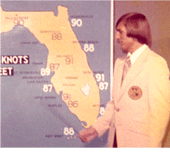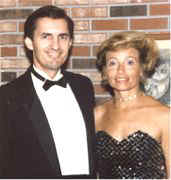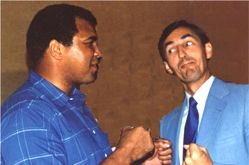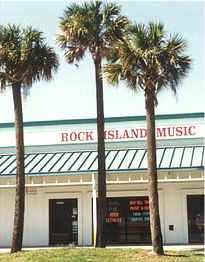

![]()
| Filling
Niches: The Alternate Road to Riches (My Sophomore Year in the Domain Business) |
|||||||||
By Ron
Jackson
One year ago I published a story in Domain Name Journal called My First Year in the Domain Business: A Rookie�s Diary. I closed that article by saying �with signs that the domain industry has bottomed out and is now on the upswing, I am extremely excited about what my sophomore year will bring�.
It turns out there was good reason to be so revved up! In fact I don�t think I could have dreamed how well the next 12 months would go. Those first inklings that the market was rebounding proved to be true and the tsunami that has swept through the industry since then has carried me along for the ride. |
|
||||||||
In May 2003, a year after entering the industry, I found myself holding 475 domains that had all been paid for with profits from 142 domain sales. There was even some surplus cash left over. I figured since that happened while the business was plodding through the worst bottom it had ever seen, things would only get better. They did. In May 2004 even I am shocked to see over 3,400 domains in my portfolio and a cash balance that has multiplied many times from where it was a year ago (even after paying for an additional 3,000 domains from profits). That explosion in assets was fueled by another 970 domain sales in the past 365 days. Before
I get into what has made it possible to consistently sell an average
of three domains a day I need to make an important point. That �I�
word is already getting old and I�ve just started the story!
It�s unavoidable in an autobiographical article but I still need
to say this. A key tenet of my faith is that any talents we
have, or successes we enjoy, are gifts from God. Since we only have
what he gave us to begin with, he deserves the credit for the fruit
any of us might bear. When
things are going well it�s tough to talk it about it without
sounding like a braggart. That�s not where I am coming from here
and, as a long time entrepreneur, I can tell you there have been
plenty of lean years I could just as easily talk about. Of course, I
don�t think many of you are interested in a story on how to
starve! In the articles I have done on other domainers I have always tried to focus on the human interest side of their stories so you can get to know them as people, as well as businessmen. In last year�s piece on my rookie year I didn�t tell you much about my own background so, while we�re in confessional mode, let�s get that out of the way too.
It
was a great place to grow up. Crime, drugs and the other ills of
modern society were almost completely absent. At the time we thought
it was the most boring place on the planet, but everyone knew
everyone else and there were always friends and parents around to
help keep you out of major trouble. Though I have an IQ of 150, I
squandered most of those mental resources in favor of chasing girls
and playing whatever sport was in season. I was able to maintain
A�s and B�s while seldom cracking a book but was basically a
case study in wasted academic potential. I
now have a 17-year-old daughter who is remarkably gifted but who,
thank God, has had the good sense to use her gifts far more
productively than I did during the same stage in life. She is a
straight A student in an extremely challenging International
Baccalaureate program and was just elected senior class
president for next fall. She plays musical instruments, is fluent in
French, writes poetry and is so motivated to succeed that she will
undoubtedly surpass anything I have ever accomplished (and will
probably do it before her 21st birthday)! I take some
pride in this because I figure her motivation may have come from
watching me keep my full potential at arm�s length for so long.
Surely I did her a favor by providing the kind of role model she
should avoid! Since
I was busy majoring in girls, sports and soul music, I entered my
senior year still not having a clue what I wanted to be or where I
wanted to go when I graduated. I was playing baseball that last
season and the local radio station broadcast many of our games (in a
town of 15,000 compelling programming was obviously hard to come
by)! When I had a good game, the play-by-play man, Bob Buchanan,
would interview me after the game. I got to know him as a result and
he asked me where I was going to college. I told him I didn�t know
where or for that matter even if! He suggested I look at his alma
mater, Eastern Kentucky University, where he knew the
baseball coach and would put in a word for me. However most of us
Buckeyes believed that people living south of the Ohio River
were all �hillbillies� so there was no way I was going to
consider that! Very twisted logic when you consider that our little
rural town was not so cosmopolitan that anyone would confuse it with
say Paris or New York (or even Omaha for that
matter). Buchanan
(obviously knowing a man of the world when he saw one) accepted my
reasoning, though the fact that I wasn�t that good a player to
begin with probably had more to do with his willingness to drop the
idea. However, determined to help me sidestep a career on the back
of a garbage truck, he later told me I had a good voice and wondered
if I would be interested in pursuing a career in broadcasting. A
light bulb immediately went off in my head and I thought, �That
sounds right up my alley. Minimal work with a massive paycheck!�
Little did I know that small market broadcasters were paid about the
same as those guys you see picking up tin cans along roadsides. Buchanan
referred me to a new broadcasting school in Columbus (in those days
very few colleges had degree programs in broadcasting). I enrolled
there the next fall and managed to skate through (after all this
isn�t brain surgery we�re talking about) and finished in the top
3 in my class. As soon as I got out, Bob�s station in my hometown,
WDLR (a tiny 500-watt AM outlet whose signal faded away as
soon as you left the parking lot), offered me a job. So I went to
work as the station�s News Director, afternoon DJ and
play-by-play man for local high school and college sports.
Wearing all of those hats meant they had to pay me some big money - $100
a week! When I arrived, Buchanan took the opportunity to move over
to the Sales Department where you could actually make a living!
Unfortunately
I was on the job less than a year before the draft board came
calling. The Viet Nam war was going full bore and the
military needed more young men ready for jungle warfare. My fighting
skills had been limited to outwrestling old girlfriends when I
wanted my class ring back, but that was apparently good enough for
the draft board! I
soon found myself in Augusta, Georgia going through basic
training at Fort Gordon. After a battery of intelligence
testing there, the Army said they were willing to send me to Officers
Candidate School. However since a lot of the guys getting shot
up in Nam were young lieutenants fresh out of OCS, I declined
and said I would prefer to serve out my two years as an enlisted
man. Fortunately they didn�t hold it against me and after basic I
was assigned to a plum position in the Fort�s press office. We
spent our days recording radio shows and writing articles for the
post newspaper (which incidentally won awards as the best military
paper in the U.S. during those years). We had a very
talented group of reporters including a young Syracuse University
graduate named Steve Kroft. Today Americans know him as one
of the key anchors on the long-running CBS news program 60
Minutes. I was one of the lucky few
that were never sent to Southeast Asia and as
my service term was coming to a close the Army offered to let
soldiers out 90 days early if they went back to school. Spending
those 3 months on campus sounded a lot better to me than being on an
Army base, so I enrolled at Ohio State and put my military
fatigues in permanent storage (though I am proud to say the Viet
Cong never made a single successful raid on Georgia
during my watch)! I
majored in journalism at OSU and it was smooth sailing because I had
already been working professionally in the field both as a civilian
and in the service. What wasn�t so easy was readjusting to those
Ohio winters! After spending two years in the sunny South, I decided that
as soon as I got out of school I had to get back across the Mason
Dixon line before I froze to death. I even overshot Georgia by
several hundred miles and landed in the Sarasota-Bradenton
area on Florida�s beautiful west coast. I took a job there
as a radio DJ with a company that also owned a new TV station. Again
the money was horrible. I had been offered twice as much to take a
radio job in Pennsylvania but the climate trumped the money
and I saw this as a chance to make the jump from radio to TV.
All of the sudden there was no money in the budget to do the things we had always done. The workplace environment at this once dominating station went sour and it was clearly time to move on. Fortunately, I had paid attention to the trouble brewing and had opened a local record store and music mail order business a year before leaving the TV station. It quickly took off, making it much easier to start a new career and get reacquainted with music which had been a longtime love.
By the year 2000, thousands of independent music stores had closed their doors around the nation. I joined the crowd that year myself, shutting down a retail operation that had been a cash machine for 12 years. I limped along for a couple more years selling only on the web, but the party was over and it was time for this entrepreneur to start looking for a new line of work. My
plunge into a third career in the domain business is where last
year�s article began (we
won�t cover the same ground here, so please read it, it will give
you some additional insight, but more importantly it will help boost
our Alexa number)! By the grace of God I have always had the
good fortune to work at something I love to do and domains have been
no different. As much as I enjoyed broadcasting and music, there are
times I feel that domains are what I was really born to do. I
love language, computers, the internet (and making money) and this
industry combines them all! The
business even gave me the opportunity to keep my journalistic skills
sharp through DNJournal.com! Better yet, the people I cover
today aren�t nearly as obnoxious as some of those athletes were
(though I am not going to mention Johnny Bench by name). This
site exists because soon after entering the industry I realized it
did not have a trade magazine of its own. In radio/TV we had Broadcasting
magazine, in music we had Billboard, in domains we had -
nothing. So I decided to set about fixing that situation, also
anticipating that it would help jump start my own late entry into
the field by bringing me into contact with a lot of the key players
in the business. Thanks
to the support of a lot of great people who have been generous with
their time and advice, it has worked out far better than I could
have hoped when I started the publication on Jan. 1, 2003.
The information we have been able to provide you appears here only
because of the remarkable cooperation we have received from the
leading companies and knowledgeable individuals in this industry.
They recognized what we were trying to do and rallied around the
flag to help us pull it off. There are too many to list them by
name, but I truly appreciate each and every one of you that has
helped make this work! At
this point, those of you who have a less sensitive side are
undoubtedly saying, �Yeah, that�s great pal, but can we skip the
hugfest and find out how you are selling all of those domains,
especially that junk you keep buying in the new extensions!� Very
well � I aim to please, so let�s talk about the key term in this
article�s headline � filling niches. In
the music business my company became one of the world�s top
sources in a specific niche - music collectibles. With all of the
chain stores busy cutting each others throats by selling new music
at or below cost, I decided to simply avoid that arena and work
another side of the tracks (collectibles and used CD�s) where the
competition was thinner and the profits margins were fatter
(averaging 100% on most items). Though the collector�s market is
much smaller than the mainstream market, it was still a very
lucrative market for those of us who serviced it because the pie was
split in far fewer pieces. With
that in mind when I entered this business I started looking for
territory that was not already being mined by the big boys. For
them, the prevailing business model involves chasing high quality .coms
and milking them for Pay Per Click revenue. I have
tremendous respect for this group. They include the industry�s
best and brightest and how can you not love a business plan built
around domains that are virtual money printing machines! The problem
is that the basic premise is so attractive you�re likely to
be trampled to death by the crowds trying to elbow their way into
the arena. The competition has pushed prices to levels I am not
willing to pursue. Any
slender chance that I would change my mind disappeared last summer
when Pool.com
came along with their auction model and reached a level of success
that forced almost everyone else to follow suit. The cost of entry
soared even higher than it was when I originally balked at the tab,
so I decided to continue to �dance with the one that brung me.�
I felt certain that sales rather than traffic conversion would be a
quicker and considerably less expensive route to viability for me
and that has proven out. I still love the traffic model, have some
domains that produce nice income and hope to gradually add more, but
it doesn't look like it will be my focal point for the foreseeable
future. Another
retail principal I brought along that I saw almost no one using in
domains was the importance of turnover. If you have good traffic
domains the last thing you want to do is give them up, but if your
income depends on sales turnover represents the same lifeblood that
traffic does to the PPC camp. I was puzzled by all those people who
stuck high price tags on domains (even if they had no traffic), then
sat around growing a beard while waiting for an elusive end user to
come along (many are still waiting). To
generate turnover while still reserving the best of my inventory for
the occasional big sale, I took (and maintain ) a two-pronged
approach. Half of my business is based on wholesaling domains
to other resellers. These frequent sales, often just $50-$150 but
done in high and steady volume, cover my basic operating expenses
(they also account for the surreal quantity of domains I sell).
The other half is generated by end user sales that have been
large enough to cover the cost of all domain acquisitions and
provide a nice cash surplus. Even
at the end user level, I aim for quicker turnover than most. Rather
than wait for corporate sales that are few and far between, I target
the customers I know best - small businessmen. As I have been one of
them for years, I understand their budgetary limitations and am
willing to meet them where they are comfortable. These sales
are typically in the three and low four figure range. However, there
are a lot of them and this segment of the market is far more
receptive to names in new extensions that (at least until recently)
have been far easier to obtain and sell with a large profit margin.
If you are focused only on the corporate market you might want to
consider that small business makes up 70% of the economy. That�s a
pretty large segment to ignore. Of
course to make this sales engine run, you have to have a steady
supply of sellable names and the only way to get those is to work
long and hard at it. I am on the hunt most of my waking hours,
especially for reasonably priced domains in niches that are being
overlooked by others. Of course before you buy domains, you first
have to learn to recognize good names and that is not as easy
as it sounds. Sales are most likely to come from generic words and
terms that define a commercially viable product or service. I
originally had great success doing this with .orgs while many
others were ignoring them. Though the extension is targeted at
non-profit groups, there are many for-profit service industries
(like the medical field) that use them extensively. Unfortunately
good ones have become much harder to come by in recent months. Still
when one door closes another often opens. Such was the case last
fall when .info hit the two-year anniversary of its rollout.
Many great names that had been registered during sunrise or on
opening day were dropped by the original registrants who decided to
give up just when the market started accepting them. For people like
me who weren�t even in the business when .info began, it was a
golden opportunity to get in the game. I took full advantage of the
situation and stayed awake all night many nights to grab the best
drops the second they became available. In the past few months I
have seen values on many of those names soar 1,000% or more
and have sold several for four figures. Fans
of traffic names argue that if you buy names without existing
traffic you are simply gambling with no guarantee of a
return. This is technically true, but not true in practical terms
for those who have developed extensive knowledge of the current
market. Those people can select names that will convert to sales a
high percentage of the time, high enough to easily offset losses
from inventory that doesn�t move. In that respect domains are no
different than any other retail product. My success in music
collectibles depended on knowing the current market values and
demand for the pieces I invested in. Some will have great success at
it and other will never get the knack. In
my opinion, a lot of people who want to make a living at this are
looking at the wrong metrics when it comes to new extensions. All
the talk is about how many developed sites are out there, what the
level of public recognition is, etc. Certainly those are important
points and as those areas grow it will only create more sales and
interest. However there is only one metric that really
matters when it comes to putting food on the table today.
That is whether or not an extension has reached an interest level
among buyers that will allow you to profitably trade in them.
.Info is already there even though it has only a tiny
fraction of the developed sites on the web. Development will certainly make things even better but for investors
(especially the ones who got in with a low acquisition cost) the
future is already here. Success
also depends on staying completely on top of what is going on in the
market day in and day out. The anti New TLD arguments I usually hear
are based on conditions that existed six months ago �
conditions that have since changed dramatically (the primary one
being that many are actually profitable to deal in now). Folks
trying to operate in this business on information that old might as
well trade their car in for a horse and buggy to complete the
ensemble. In
every business I have been involved in I have also tried to look beyond
today. If it looks like trouble could develop a year down the road I
want to be the frog who has another lily pad ready to leap to.
That�s why I opened my music business a year before I left
TV. One thing I am seeing now is that even new extensions are
getting expensive. The .biz run up at Pool just in the past
month has been a real eye opener. First I saw dozens of them that
would have been available for a reg fee earlier this spring going to
Pool for the $60 minimum or a little above. This week I am seeing
domains of the same quality ending well into three figures.
With
things headed in this direction, if I had to predict what lies ahead
for my junior year in the business, I would guess I will be spending
as much or more time developing my current properties as pursuing
new ones. With programs like Google Adsense now available to
help site publishers monetize their efforts, it is a good
environment for developers. In fact I am currently wrapping up a new
site that should be online by the end of the month and I will start
on two more as soon as it is done. Those are all domain related but
once they are out of the way I expect to move on to content rich
sites on other topics. That is probably a factor in the current market
rebound as people try to secure everything they can in advance of
the uncertain times ahead. WLS could still be headed off at the pass
by legal action, but my current strategy will be unaffected either
way. I believe developing is the primary exit door if you need to
escape the domain acquisition rat race. Of course the biggest
development of all could end up being an unforeseen change that
turns everyone�s plans upside down. Given past history, the
irony is that something unexpected is exactly what we should expect!
Editor�s
Note: For those who would like to comment on this story,
we invite you to make use of our Letters to the Editor
feature (write to [email protected]). If you missed our previous Cover Story click on the headline below: Sedo's
Ascent: How the German Juggernaut Became A Global Giant |
|||||||||
|
|
Copyright 2003
Domain Name Journal
A Division of
Internet Edge, Inc.





